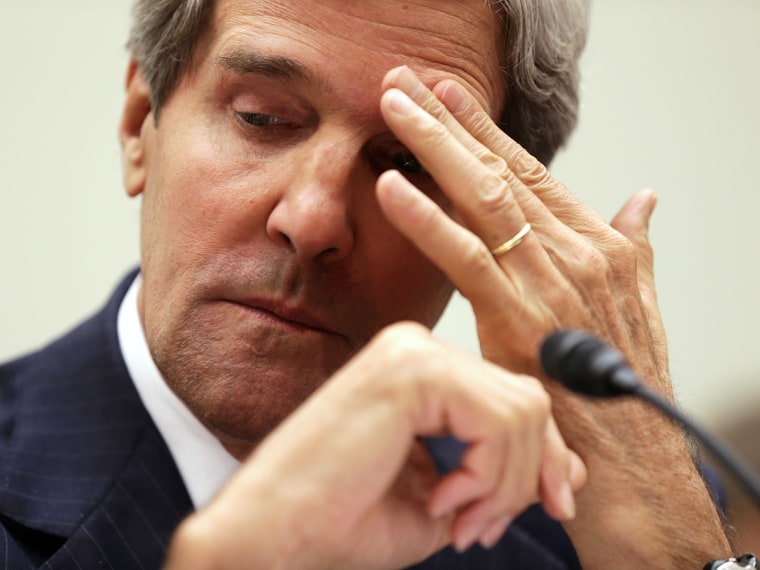The Senate Foreign Relations Committee approved a resolution with a 10-7 vote Wednesday authorizing the use of force in Syria. The debate will now move to the full Senate, which is expected to reconvene Sept. 9 after the August recess.
Republican Sens. John McCain of Arizona, Bob Corker of Tennessee and Jeff Flake of Arizona joined seven Democratic senators, including Barbara Boxer of California, Ben Cardin of Maryland, Jeanne Shaheen of New Hampshire, Chris Coons of Delaware, Dick Durbin of Illinois, Tim Kaine of Virginia, and Bob Menendez of New Jersey in approving the resolution.
Democratic Sens. Tom Udall and Chris Murphy of Connecticut voted against the resolution, in addition to Republican Sens. Marco Rubio of Florida, Rand Paul of Kentucky, Ron Johnson of Wisconsin, John Barrasso of Wyoming, and James E. Risch of Idaho. Democratic Ed Markey of Massachusetts just voted “present”.
The resolution passed after the committee adopted language from McCain that included the goal of changing “the military equation on the battlefield.”
The Senate resolution limits military action in Syria to 60 days, with the potential for a 30-day extension. It also prohibits putting American groups on the ground, although the language may provide some loopholes for the Obama administration to extend any military action.
Meanwhile, a day after getting grilled by the Senate Foreign Relations Committee, members of President Obama’s national security team faced another round of tough questioning from House lawmakers demanding more answers on the administration’s plans and its endgame for military intervention in Syria.
The House Foreign Affairs Committee’s hearing comes as Obama made the international case for military strikes in Syria on Wednesday. In Sweden, en route to Russia for the G-20 summit, the president argued the world’s credibility is on the line if it doesn’t hold Syrian President Bashar al-Assad responsible for allegedly turning chemical weapons on his own people, killing more than 1,400 on Aug. 21.
“I didn’t set a red line, the world set a red line,” said Obama.
Secretary of State John Kerry, who testified Wednesday alongside Secretary of Defense Chuck Hagel and Gen. Martin Dempsey, chairman of the Joint Chiefs of Staffs reiterated Obama’s remarks, adding: “This debate, I might add to you, is also about Congress’ own red line.” Kerry noted that Congress agreed to the Chemical Weapons Convention and passed the Syria Accountability Act, which says Syria's chemical weapons "threaten the security of the Middle East and the national security interests of the United States."
Kerry argued inaction will be far more detrimental, adding that Iran, North Korea and Hezbollah are all hoping America looks the other way.
“Let me be clear. We are not asking America to go to war…We all agree, there will be no boots on the ground. The president has made crystal clear: We have no intention of assuming responsibility for Assad’s civil war. That is not what is in the cards…He is asking only for the power to make certain that the United States means what we say. He is asking for authorization to degrade and deter Bashar al-Assad’s capacity to use chemical weapons.”
Some, like Democratic Rep. Eliot Engel of New York, said he strongly agreed with Obama for a limited strike but isn’t for giving the president a “blank check.” The ranking Democratic on the committee said “If we do not pass the authorization, what message will Assad get?”
Several lawmakers, however, including Republican chairman Ed Royce of California, expressed concerns during the House committee hearing about Assad escalating violence if America intervenes. “The president promises a military option in Syria of limited scope and duration. But the Assad regime would have a say in what happens next. That’d be particularly true as President Obama isn’t aiming to change the situation on the ground. What are the chances of escalation? Are different scenarios accounted for? If our credibility is on the line now, as is argued, what about if Assad retaliates?”
Democratic Rep. Greg Meeks of New York said he’s concerned about the U.S. acting unilaterally without support of an international coalition.
And Republican Rep. Ted Poe of Texas said he’s worried that the Assad regime could retaliate against America or its allies. When asked if U.S. escalation is possible, Dempsey said he can’t say the risk is zero but America’s limited purpose and partnerships in the region “begins to limit that risk.”
Dempsey also said the U.S. is “postured to respond” to any Assad retaliation but did not elaborate.
When Democratic Rep. Gerry Connolly of Virginia asked about the likelihood that Assad will use chemical weapons as a “routine weapon” if the United States decides to do nothing, Hagel said the chances were “very high.” Kerry said “I might even put it at 100%.”
President Obama gained support for the strike from GOP leaders on Tuesday when House Speaker John Boehner and Majority Leader Eric Cantor both said they would support the president’s request to strike Syria. Key Dems, including Sen. Harry Reid and Rep. Nancy Pelosi are also supporting the president on Syria.
